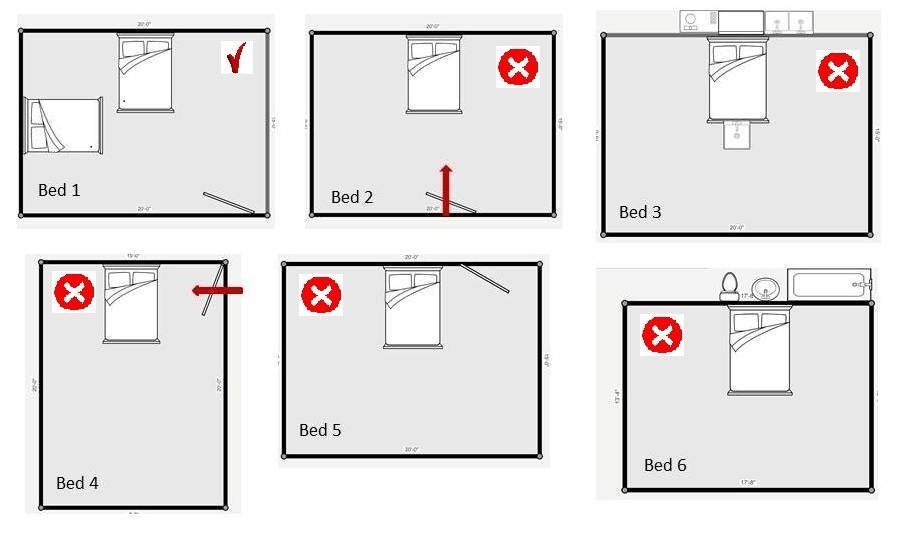Finding Your Best Sleep Direction: Feng Shui Bed Placement

Have you ever woken up feeling unrested, despite a full night's sleep? Perhaps the answer lies not just in the quantity of sleep, but in the quality, and surprisingly, the direction your bed faces. Feng shui, the ancient Chinese practice of harmonizing individuals with their surroundings, offers insightful guidance on bed placement for optimal energy flow and restful slumber. Finding the right feng shui bed direction can potentially transform your sleep and, in turn, your overall well-being.
Feng shui, literally translated as "wind-water," is a system that considers the placement and arrangement of objects within a space to create balance and harmony. It's based on the belief that our environment interacts with our personal energy, influencing our health, relationships, and prosperity. When it comes to the bedroom, the bed is the most significant piece of furniture, as it's where we spend a considerable portion of our lives rejuvenating. Thus, determining the ideal feng shui bed positioning is crucial.
The practice of feng shui dates back thousands of years in China. It evolved from observations of nature and the flow of energy, known as "qi." Initially used for siting tombs and important buildings, feng shui principles eventually expanded to encompass homes and everyday living. The core concept involves optimizing the flow of qi to promote positive energy and minimize negative influences. In the context of bed placement, the goal is to position yourself to receive nourishing qi while sleeping.
So, which way should your bed face according to feng shui? There isn't a single universally ideal direction. The best feng shui bed direction is determined individually based on your Kua number, a calculation derived from your birth date and gender. Your Kua number reveals your most auspicious directions for sleeping, working, and other activities. While a feng shui consultant can help you determine your Kua number and corresponding optimal bed direction, online calculators and resources can also provide guidance.
Beyond the Kua number, certain general guidelines apply to feng shui bed placement. Avoiding positioning your bed directly in line with the door, often referred to as the "coffin position," is a common recommendation. This placement is thought to disrupt the flow of qi and create a sense of vulnerability. Similarly, positioning your bed with the footboard facing the door is generally discouraged. It’s also beneficial to have a solid wall behind your headboard, providing a sense of support and stability. Positioning your bed under a window is also often discouraged due to potential energy drafts and a lack of a sense of security.
One benefit of proper feng shui bed placement is improved sleep quality. By aligning your bed with your auspicious directions, you may experience deeper, more restful sleep, waking up feeling refreshed and energized. Another potential benefit is enhanced well-being. Harmonizing your bedroom with feng shui principles can create a sense of peace and tranquility, promoting relaxation and reducing stress. Additionally, some believe that optimal bed placement can improve relationships, fostering a stronger connection with your partner.
To determine the best direction for your bed according to feng shui, start by calculating your Kua number. Once you know your Kua number, you can identify your auspicious directions. Then, consider the layout of your bedroom and position your bed accordingly, avoiding the inauspicious placements mentioned earlier. Experiment with different arrangements and observe how you feel after sleeping in each position.
Advantages and Disadvantages of Considering Feng Shui for Bed Placement
| Advantages | Disadvantages |
|---|---|
| Improved sleep quality | Can be complex to implement fully |
| Enhanced sense of well-being | May require rearranging furniture |
| Increased energy levels | Limited scientific evidence |
Five best practices for feng shui bed placement: 1. Calculate your Kua number. 2. Position your bed with a solid wall behind the headboard. 3. Avoid the "coffin position" and footboard facing the door. 4. Consider the overall layout and flow of qi in your bedroom. 5. Experiment and adjust until you find the most harmonious placement.
Frequently Asked Questions:
1. What is feng shui? (Answered above)
2. What is a Kua number? (Answered above)
3. Why is bed placement important in feng shui? (Answered above)
4. Can feng shui really improve my sleep? (Some believe it can by creating a harmonious environment.)
5. What if I can't position my bed according to my Kua number? (Prioritize avoiding the most inauspicious placements.)
6. Do I need a feng shui consultant? (Helpful, but not essential, resources available online.)
7. Are there any other feng shui tips for the bedroom? (Yes, many related to color, decor, and clutter.)
8. Where can I learn more about feng shui? (Books, websites, and apps are available.)
Incorporating feng shui principles into your bedroom design, particularly when considering which way your bed should face, can be a powerful way to enhance your sleep and overall well-being. While the concept of aligning your bed with auspicious directions might seem esoteric, the underlying principles of creating a balanced and harmonious environment resonate with many. By paying attention to the placement of your bed and other elements in your bedroom, you can cultivate a space that supports rest, rejuvenation, and a sense of peace. Take the time to experiment with different arrangements, observe how they impact your sleep, and embrace the potential for positive change that feng shui offers. Start exploring the world of feng shui today and discover how it can transform your bedroom into a sanctuary of restful sleep and renewed energy.
Unveiling the jefferson family a look at thomas jeffersons siblings
Denver boat dreams your guide to colorado boating
Find your perfect toyota rav4 in arkansas your ultimate guide







:max_bytes(150000):strip_icc()/tips-for-a-bed-aligned-with-the-door-1274764_V4-ae548e671d994414ae9d9fddc4ab0623.jpg)